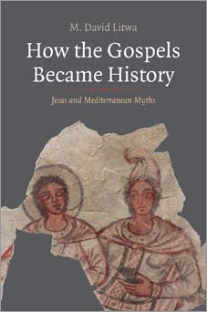 In chapter 9 M. David Litwa sets the Jesus narrative, specifically as told in the Gospel of Matthew, in the context of literary tropes surrounding ancient lawgivers.
In chapter 9 M. David Litwa sets the Jesus narrative, specifically as told in the Gospel of Matthew, in the context of literary tropes surrounding ancient lawgivers.
Solon of Athens: See his life by Plutarch and
Lycurgus of Sparta: See his life by Plutarch and Herodotus
Numa of Rome: See Plutarch
Zoroaster of Persia: See Internet Archive
Minos of Crete: See Dictionary of Greek and Roman Biography and Mythology
Charondas of Sicily: See Harpers Dictionary of Classical Antiquities
Zaleucus of southern Italy: See Dictionary of Greek and Roman Biography and Mythology
Mneves (Menas) of Egypt: See Diodorus Siculus (scroll down to para 94)
Zalmoxis (Salmoxis) of Thrace: See Herodotus and Strabo (scroll down to paras 39-40)
And, of course, not forgetting . . .
Moses: See Philo, parts 1 and 2; Josephus; Hecataeus; Artapanus
It seems more likely that Jesus was thought to have a coherent “message’ only after his death and so we have several different creations of it. . . .
[E]ither Q, Thomas, Matthew, Mark, Luke, and, for that matter, John did not know clearly what Jesus’ teachings were; or they didn’t care; or that they did know but disagreed with him so that they revised what he taught into something else; or that they did know what were said to be his teachings, did not trust those reports, and revised accordingly. Something odd is going on here. . . . .
When Sanders, standing in here for nearly all Jesus research scholars, says, “I do not doubt that he was a great and challenging teacher,” I am baffled. Mark doubts it (4:10-12, 8:17-21), neither Paul nor John pay any significant attention to those teachings, Luke cares little about the matter (taking Acts as representative of Luke’s bottom-line assessment). Scholarship, theological and historical both, is in a state of near conceptual chaos regarding the message of Jesus the Teacher: countercultural wisdom sage, peasant Jewish Cynic, Pharisaic rabbi, antipatriarchal communalist, eschatological preacher? If he had a coherent message and neither we nor his known near contemporaries know for sure what it was, he ought not to be thought, first and foremost, to have been a great and challenging teacher.
(Davies, Jesus the Healer, 12 f)
A few scholars (I’m thinking of Stevan Davies) even question the extent to which Jesus should be thought of as a teacher, or at least they draw attention to the doubts they have that we can even know what he taught.
Rewriting a biblical miracle for a gentile audience
Chapter 10 on the narratives of Jesus as a miracle worker I found of more interest, perhaps because this aspect of Jesus is covered in all four gospels.
Here Litwa’s philosophical introduction on the nature of miracles is too embedded in apologetics for my taste. He prefers to think of “inexplicable” events and repeats the apologetic argument that plausibility is culturally determined, that everything follows a law of nature as determined by God but that some of these divinely created laws or events we simply don’t yet understand. He writes
In the ancient world, plausible miracles could parade as historical; implausible ones were often labeled “mythical” (mythodes).
(Litwa, 136)
The first example of a “plausible miracle” raises problematic questions when it comes to how we are meant to understand Jesus’ miracles, however. According to Litwa’s reading Josephus used the “miracle” of Alexander’s crossing of the Pamphyialn Sea as a precedent that gave credibility to the Israelites crossing the Red Sea.
The story that the Pamphylian Sea receded before Alexander’s army, however, was apparently credited. According to historical report, Alexander’s entire army in all their heavy equipment passed through a sea channel that would have normally drowned them. This account was first told by Callisthenes of Olynthus, official historian of Alexander’s campaign and an apparent eyewitness of the event. Callisthenes assimilated Alexander to Poseidon by writing that the Pamphylian Sea “did not fail to recognize its lord, so that arching itself and bowing, it seemed to do obeisance [to Alexander].”5
Josephus mentioned the Pamphylian Sea miracle to make plausible his historiographical account of Moses parting the Red Sea.6 He knew that qualified and respected historians presented Alexander’s sea miracle as historiography.7 He even remarked that “all” historians agreed that the sea made a path for Alexander’s army.8 Thus Josephus felt justified in presenting his own (Jewish) sea miracle as an actual event in the past.
(Litwa, 136)
But there’s a but. Josephus changed the story as found in the Book of Exodus so it read more like a rare and coincidental natural event like the account of Alexander’s crossing. Here is Exodus 14:21-25 Continue reading “Review, parts 9 and 10a. Jesus as Lawgiver and Miracle Worker (Litwa: How the Gospels Became History)”
